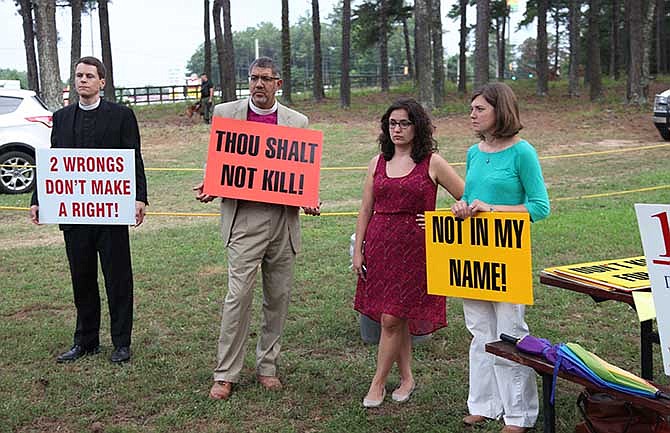JACKSON, Ga. (AP) - In the first lethal injection since a botched execution in Oklahoma nearly two months ago, a Georgia death row inmate convicted in 1993 of raping and murdering his 15-year-old neighbor was executed just before midnight Tuesday.
Marcus Wellons, 59, was executed by injection after several last-minute appeals were denied. He was pronounced dead shortly before midnight. The execution seemed to go smoothly with no noticeable complications.
Wellons was convicted and sentenced to death in 1993 for the 1989 slaying of his neighbor, India Roberts, a high school sophomore from the Atlanta suburbs. Authorities say Wellons raped and strangled the teen. Police found Roberts' naked body in the woods with cuts on one side of her face and ear, and bruises on her neck.
Before the execution began, Wellons said he hoped his death could give Roberts' family peace.
"I'd like to apologize to the Roberts family for my crimes and ask for forgiveness," Wellons said.
He then thanked his friends and family for their support and said, "I'm going home to be with Jesus."
He hummed as an unidentified clergy member read a prayer and then said, "Amen."
Georgia uses one drug - the sedative pentobarbital - for executions, while Oklahoma and some other states use three.
From the time he was brought into the room at a prison in Jackson and the tubes for the drugs were placed and all other preparations were done took about 35 minutes. Wellons was lying still with his eyes closed while the drugs were administered. A few minutes into the procedure, Wellons took a couple of heavy breaths and blew air out through his lips as if snoring, but by about 5 minutes into it, there was no visible movement.
The warden left the room at 11:32 p.m. It wasn't immediately clear exactly when the drugs administered but typically it is within a minute or two after the warden leaves.
Several minutes before Wellons was declared dead, a corrections officer standing near the gurney fainted, causing a stir among execution witnesses. A Department of Corrections official said the officer has been present for numerous executions and his fainting was unusual.
Nine executions nationwide have been stayed or postponed since late April, when Oklahoma prison officials halted the execution of Clayton Lockett after noting that the lethal injection drugs weren't being administered into his vein properly. Lockett's punishment was halted and he died of a heart attack several minutes later.
Wellons' execution, set originally for 7 p.m., began nearly four hours later, after the U.S. Supreme Court issued its order refusing to grant a last-minute reprieve.
A federal judge did approve a request by Wellons' lawyers to have an anesthesiologist they selected witness the execution. Wellons' lawyers argued that the state's refusal to provide information about the drug made it impossible to mount a successful challenge based on the Eighth Amendment, which protects against cruel and unusual punishment.
Among his appeals to the U.S. Supreme Court was a challenge to the secretive process used to obtain the drugs from unidentified, loosely regulated compounding pharmacies.
Like many other states, Georgia has had trouble obtaining execution drugs in recent years because major drugmakers, many based in Europe where opposition to capital punishment is strong, began refusing to sell their products if they were to be used in executions.
The Georgia Department of Corrections confirmed last week that it had secured the pentobarbital for Wellons' execution from a compounding pharmacy, which custom-makes drug preparations.
Tuesday's execution marks the first time the state used a compounded drug in an execution, though other states have done so.
Roberts was killed the morning of Aug. 31, 1989, after she said goodbye to her mother and left for school. Not long afterward, a neighbor heard muffled screams from inside the nearby apartment of Gail Saunders, authorities said.
Authorities say Wellons had been dating Saunders and lived with her at her apartment in the summer of 1989. Later that afternoon, a man driving near a wooded area by the apartment complex called police saying he had seen a man carrying what appeared to be a body in a sheet.
Evidence suggested Wellons forcibly brought Roberts from the kitchen to the bedroom and strangled her, authorities said. An autopsy indicated she had been raped.
A jury found Wellons guilty of rape and murder and recommended the death penalty.

